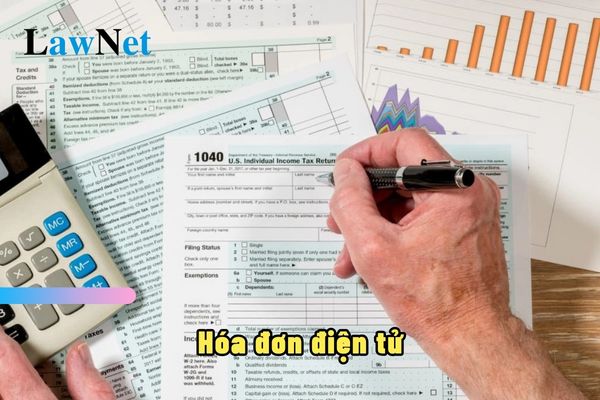Does a enterprise need to issue e-invoices for goods used as salary payment to employees in Vietnam?
Does a enterprise issue e-invoices for goods used as salary payment to employees in Vietnam?
Based on Clause 1, Article 4 of Decree 123/2020/ND-CP regulating the principles of issuing, managing, and using invoices and documents as follows:
Principles of issuing, managing, and using invoices and documents
1. When selling goods or providing services, the seller must issue an invoice to deliver to the buyer (including cases where goods or services are used for promotion, advertisement, samples; goods or services are used for gifts, exchange, payment in replacement of wages for employees and internal consumption (excluding goods in internal circulation for continued production processes); dispatching goods in the form of lending or return goods) and must fully record the contents as prescribed in Article 10 of this Decree; in the case of using e-invoices, it must follow the standard data format of the tax authority as prescribed in Article 12 of this Decree.
2. When deducting personal income tax, collecting taxes, fees, charges, the tax deduction organization, the fee collection organization, the tax-collecting organization must issue tax deduction documents, tax, fee, charge collection receipts to the individuals whose income is tax-deducted, the taxpayers, and must fully record the contents as prescribed in Article 32 of this Decree. In the case of using e-receipts, the format must adhere to the standard data format of the tax authority. If an individual authorizes the tax settlement, no personal income tax deduction document is issued.
For individuals who do not sign labor contracts or sign labor contracts under 03 months, the organization or individual paying income can choose to issue a tax deduction document for each tax deduction or issue one document for multiple tax deductions in a tax period. For individuals signing labor contracts of 03 months or more, the organization or individual paying income only issues one tax deduction document per tax period.
3. Before using invoices and receipts, enterprises, economic organizations, other organizations, households, individual businesses, and organizations collecting taxes, fees, and charges must register the use with the tax authority or issue a release notice as prescribed in Articles 15, 34, and Clause 1 Article 36 of this Decree. For invoices and receipts printed by the tax authority, the tax authority issues a release notice according to Clause 3 Article 24 and Clause 2 Article 36 of this Decree.
4. Organizations, households, and individual businesses must report the use of invoices purchased from tax authorities, report the use of printed, self-printed, or purchased receipts from tax authorities in accordance with Articles 29, 38 of this Decree.
5. The registration, management, and use of e-invoices and documents must comply with regulations on e-transactions, accounting, tax, tax administration, and regulations stated in this Decree.
6. Invoice and document data when selling goods, providing services, document data when conducting transactions of tax payment, tax deduction, and paying taxes, fees, and charges are the database to serve tax management tasks and provide invoice and document information to relevant organizations and individuals.
...
Thus, according to the above provisions, when a enterprise uses goods as salary payment to employees, it still must issue an invoice.

Does a enterprise need to issue e-invoices for goods used as salary payment to employees in Vietnam? (Image from the Internet)
What are prohibited acts related to invoices in Vietnam?
According to Article 5 of Decree 123/2020/ND-CP, the prohibited acts related to invoices are as follows:
- For tax officials
+ Causing inconvenience or difficulty for organizations or individuals purchasing invoices or documents;
+ Having acts of covering up or colluding to allow organizations or individuals to use illegal invoices or documents;
+ Accepting bribes during inspections or audits regarding invoices.
- For organizations and individuals selling or providing goods and services, and related organizations or individuals
+ Engaging in fraudulent acts such as using illegal invoices or illicitly using invoices;
+ Obstructing tax officials in performing their duties, specifically acts that damage the health and dignity of tax officials during the inspection or audit of invoices and documents;
+ Unauthorized access, alteration, or destruction of information systems on invoices and documents;
+ Offering bribes or conducting other acts related to invoices and documents for illicit gain.
What are regulations on the storage and retention of e-invoices in Vietnam?
According to Article 6 of Decree 123/2020/ND-CP, regulations on the storage and retention of e-invoices are as follows:
- Invoices and documents must be stored and retained ensuring:
+ Safety, confidentiality, integrity, completeness, and no changes or deviations during the retention period;
+ Proper and sufficient retention term according to accounting law.
- e-invoices and documents must be stored and retained by e-means. Agencies, organizations, and individuals have the right to choose and apply suitable methods for preserving and storing e-invoices and documents in line with their operational characteristics and technological capabilities. e-invoices and documents must be readily printable or accessible when requested.
- Invoices printed by the tax authority or self-printed documents must be stored and retained as follows:
+ Unissued invoices and documents must be retained in warehouses according to document retention policies with value.
+ Issued invoices and documents in accounting units must be retained as per regulations concerning the retention and storage of accounting documents.
+ Issued invoices and documents in organizations, households, and individuals who are not accounting units must be retained and stored as the personal assets of those organizations, households, or individuals.

